#radha marriage
Explore tagged Tumblr posts
Text
So I was rereading the Dushyanta and Shakuntala story, and I just noticed the worst thing ever. Every mortal couple in Hindu Mythology that anyone ever called the "definition of true love" has been sundered from one another in at least one version, and usually this involves the woman being innocent and the man being either duty-bound or a jerk.
Krishna has to leave Vrindavan and Radha for Mathura. I whole-heartedly believe this was inevitable unless Radha left Vrindavan, so I don't take Krishna-slander regarding this but. They never really get together together after that so Idk tbh.
Rama, of course, does the whole Agni-Pariksha thing, even if we don't take the Uttar Kand, and if we do, he goes from reputation-obsessed questionable man to utter jerk who absolutely doesn't deserve to be called Purushottam.
And although Kalidasa did an excellent job of making Dushyanta and Shakuntala's story one of star-crossed lovers, in most other cases, Dushtyanta (in an effort to pull a Rama) outright lies and calls Shakuntala a harlot in open court when she asks him to help raise their son. The only good thing about that "love" story is the ABSOLUTE Tongue-Lashing (TM) Shakuntala gives him. Other than that, it's basically a man coercing a sheltered woman into doing the deed, later trying to humiliate her in public when asked to take accountability, and then passing it off as 'upholding her reputation.'
Honestly, we have so many good love stories I did not expect these to be the benchmark of love 🥲🫠
#like honestly dushyanta trying to act like rama made me so mad#at least rama gathered an army and fought to free his wife#you just saw a woman vulnerable and alone and talked her into being with you#then STRAIGHT UP DISAPPEARED#after promising her A WHOLE ESCORT. Like she had to go to him herself because this AH just abandoned her like a fling#after calling it a gandharva marriage. Also Shakuntala wasn't asking anything for herself she just wanted her son to get his due#and this man with his dusty yayati lineage has the AUDACITY to call her a liar and low born#AFTER knowing her parents were Vishwamitra and Menaka#so not only is HE the liar but he's also classist and casteist and narcissistic and delusional#i like kalidasa's dushyanta much better#yes this was an excuse to go on a dushyanta rant#ramayan#ramayana#rama#sita#krishna#radha#mahabharata#mahabharat#dushyant#shakuntala#dushyanta#hindu mythology#hindublr#boo blabs
51 notes
·
View notes
Text
Fire (1996): A Mostly Spoiler Free Pitch Because You Should Watch It Immediately
It's time for "An Indian QL bulldozed past my expectations and I am reeling in awe", Part Two!

A few days ago, @neuroticbookworm told me about Fire, an old lesbian Indian movie she'd been wanting to watch. Me being me, I promptly tracked it down and settled in to watch it.
Very loosely based on the 1942 short story Lihaaf, the movie follows Sita, a newly wed bride who is settling in with her in-laws, which is how she meets Radha, who is married to her husband's brother. Both in unhappy marriages, they find solace and company with each other, quickly falling in love. Length: 1 Hour 40 Minutes TWs: Homophobia, C-word mentioned once, some depictions of domestic violence Release: 1996
The is almost entirely in English, and while one generally expects Bollywood movies to be in Hinglish, it's definitely a conscious choice here, which does make me wonder if the movie was supposed to be promoted to a greater international audience. You can find it here on Youtube, most of the (very few) Hindi dialogues have hard subtitles. I think it's also available on Prime? It wasn't available in India though, which is odd, but I didn't bother investigating. Let me know if anyone can figure anything out about this!
Going into this movie, I expected a melodramatic, emotional movie with a bittersweet tone. I did not expect a biting, incredibly engaging movie with excellent satire, symbolism, discussions of chastity culture, and an incredibly sweet, beautifully written romance. And I was certainly not prepared for how incredibly horny this movie is??? Both in subtle tension and overt sex scenes. There's also partial nudity, which again, completely unexpected. If you're going taboo, go taboo all the way I suppose. It's also very well directed, and while I'm not nearly as good at identifying details like that as some of the people on here, I did pick up on some colour coding and interesting framing. It's just overall packed with little details that I think a lot of us would have a field day analysing.
Honestly, I could talk about the cultural nuances in this movie for hours. Contrary to my assumption about the reasoning behind making the movie fully in English, the movie seems to rely on the viewer's understanding of North Indian customs to deliver a lot of it's messages, particularly with its satire, more on that below. While I don't think it's necessary to enjoy the movie, it definitely does add some meat to the story. Then again, I'm a biased party, so it'll be hard to determine just how many messages may be lost to someone from outside of India without someone to compare notes with (this is me shamelessly trying to get you to watch the movie). Honestly, I'd be 100% down to write a more detailed, spoiler-including post that goes into the implicit nuances if people are interested.
There's two main selling points for the movie; the incredible way it shuts down purity and chastity ideology and the absolutely adorable relationship between Radha and Sita. The movie is set on ruthlessly tearing down and emphasizing the ridiculousness of purity culture. A lot of the messaging is indirect and uses metaphors, but there's also several explicit scenes addressing the issue. It's one of the main themes of the movie and I'm almost convinced the real reason it's titled 'Fire' is the sheer number of burns it dishes out on this subject. The romance portion of this movie is one of the thing's that completely defied my expectations. It wasn't sad and dramatic, it was heartfelt and silly and adorable. There's several scenes of the two subtly flirting, laughing together and just being lowkey in love. But that's not to say there's no emotional depth—they're also there for each other and are quite vulnerable with each other.
The movie used a lot of metaphors, but my favourites were the almost satirical representation of mythological stories. In a religion as diverse as Hinduism, every holiday has two dozen stories behind it and each story has two dozen versions, so it's to be expected that you'll find a number of problematic or otherwise kind of ridiculous stories in the mix. The stories were told completely seriously, but the context of the movie highlights their absurd facets in a truly brilliant way. I'm not going to give too much away, but I will say, it was a delight to watch the juxtaposition of the myths and the storyline of the movie, particularly it's ties to the purity culture discussion. You'll understand when you watch it. I'm not turning this into a Hindu mythology lesson (yet) but one interesting tidbit is that Radha and Sita are both names of mythological figures; namely the partners of two of the most worshipped avatars of the god Vishnu: Krishna and Rama respectively. And I was overjoyed to find that their names do have relevance to the metaphors in the story, particularly Sita's.
When the movie was first released, there were massive protests against it, I'm talking hundreds of people storming into theatres to destroy them and drive away audiences. I don't know what to say here beyond this, but what I will say is that I think Fire is an amazing movie that absolutely does not deserve to be lost to the sands of time. I hope you give it a shot, and if you do, tag me in any posts you make about it!
Tagging people who seemed interested in recs from my last post, let me know if you'd rather I not tag you!
@lurkingshan @impala124 @bengiyo @letgomaggie @winnysatang
@watertightvines @nutcasewithaknife @blorbingqls @twig-tea
@waitmyturtles @cryingatships @benkaben @usertoxicyaoi
@befuddledcinnamonroll @flyingrosebeetle
#me when the sex scene gets more spicy than im used to: BOOB?!?!?#no but seriously. it's so good. it's positively delightful#both of the lead actresses also seem to be somewhat critically acclaimed and are also activists!!#i kept feeling like i had seen Shabana Azmi (radha's actress) somewhere but couldn't put my finger on it#asked a friend and remembered i saw her in the supremely mid Rocky Aur Raani which was somewhat popular i think#i have things to say about the ending too but i don't want to spoil it because it's so insane#burn (1996)#queer indian media#queer media#desiblr#recs#indian gl#gl#iql#movie recs#movies#queer movies
127 notes
·
View notes
Text
⌑ Who exactly are Soulmates? And how do fine one ? 𖤐
[ A deep + detailed post ]
It is certainly almost impossible to find the soulmate—even if ALL facilities are available. The earth is big, millions and millions of people; and life is very short—how are you going to find your soulmate? And remember, even if all the facilities are available… right now, no facilities are available. It becomes even more impossible when facilities are not available, when you are prevented in every way from finding the soulmate. But even if you are helped, educated in how to find the soulmate, then too it will be difficult to find them in a small seventy years’ life. It rarely happens; it is a rare phenomenon.
Man has seven centers. The lowest is the sex center and the highest is the samadhi center, and between these two there are five more centers. It is a ladder. When all the seven centers of a man are in tune and harmony with all the seven centers of a woman, then you have found the soulmate.
It has happened only once in a while—with Krishna and Radha, with Shiva and Shakti. It could have also happened to Majnu and Laila if they had been allowed to meet, to Shiri and Farihad if they had been allowed to meet—but the society hindered them. And remember: Krishna and Radha were not allowed by the society either; it was not a legal marriage, it was illegal. Radha was not Krishna’s wife but just a girlfriend. And with Shiva and Shakti, the parents were very much against Shakti getting married to Shiva. He looked a very strange man—he was. It was against the parental advice that Shakti jumped into a love affair with Shiva.
But only once in a while has this happened, and this seems to be natural.
Whenever it happens, absolute oneness is felt—unity, not union. Two persons utterly disappear into each other; there is not even a small, thin screen dividing them; there is no division at all. It is UNIO MYSTICA. Two persons function as if they are one person; two bodies, but one soul. It is absolute harmony. It is love at its peak. No meditation is needed—this love is enough.
You must have seen Shiva temples in India; you must have seen the SHIVALINGA. SHIVALINGA simply represents the orgasmic state of these two lovers. SHIVALINGA simply represents Shiva as masculine energy; and just below SHIVALINGA—the phallic symbol—is the symbol of Shakti: YONI. SHIVALINGA and Shakti’s YONI are meeting; they have become one, they have disappeared into each other. They have lost ALL personality. That’s why it is the only image in the world which has no face. Just pure energy is symbolized by LINGA and YONI, by the male sexual organ and the female sexual organ. Simply energy is represented—creative energy, vital energy; energy out of which the whole of life flows. Neither does Shakti have any face nor does Shiva have any face; those faces are no more meaningful, the personalities have disappeared. It is a meeting of pure energy.
And only pure energies can dissolve into each other—because if you have a solid personality it will obstruct dissolution. Only pure energies, liquid, can enter into each other and become one. If you put two rocks together, they may be together but they cannot become one. But if you pour water into water, it becomes one.
At this highest peak where all the seven centers meet, persons disappear, only energies remain, a play of energy, a play of consciousness. And the joy is constant, it is orgasmic. It is a spiritual communion. No meditation is needed for such a couple—because for such a couple love is meditation enough. It is a mystic phenomenon, it is transcendental.
But it is very rare. Amongst millions and millions of people, once it will happen. It will be almost a chance meeting.
Below it, there is another meeting: six centers meeting. That too is rare. If the first is one percent, the second is only two percent. It is union, not unity. It is not a cosmic, mystical union, but still something very close to it—an aesthetic union, an artistic phenomenon, a poetic experience. The first can be understood only by those who have known samadhi, satori. The second can be understood by poets, painters, dancers, musicians.
The third, lower than that, is the meeting of five centers. It is three percent possible. It is not even a union; it is duality. Two persons remain two, but still there is great harmony. The two function in harmony—as if two musical instruments are playing in harmony. But the two remain two. There is no union, there is no unity. They are separate. This is what Kahlil Gibran has described: ‘Lovers should be like two pillars of a temple supporting the same roof, yet apart and separate.’ This is a little lower than the aesthetic, artistic, musical experience. It is a moral experience—chaste, still beautiful.
The fourth is four centers meeting. It has a four percent possibility. Duality. Harmony has disappeared but there is great understanding still—great understanding about each other, great caring about each other. There is no spontaneous harmony, but out of understanding a certain rhythm is maintained. It is an experience of great intelligence; it is not even moral. One has to be aware—if one is not aware, one will fall from this fourth state.
Then there is the fifth: three centers meeting. Five percent possibility. Duality becomes more and more emphasized. Understanding is still there but not constant—flickering, shaky. Once in a while conflict arises, but it is not disruptive of love. On the contrary, it adds to it, makes it a little more spicy. It is a psychological experience.
Below it is two centers meeting—Six percent possibility. Great duality, clearcut duality. Moments, only moments, of understanding. And conflict comes too much. It is almost fifty-fifty: fifty percent understanding, fifty percent conflict. It is a physiological experience. Still a great balance is there because of this fifty percent understanding, fifty percent conflict.
And below it is one center meeting—seven percent possibility. Too much conflict. Rare moments of joy, very rare. Once in a while, few and far between. But still worth it! It is a sexual experience.
And below it, the lowest, is no centers meeting—the common, garden variety. These are the couples you meet. It is not even a sexual experience; it is even below sexual experience. It is more or less masturbatory. It is only a certain kind of social, economic, political arrangement. It is exploitation. It is businesslike. It is more or less part of the marketplace, the arranged marriage. No love. No respect. Not even hate! Because hate can exist only if some love is there. It is neither friendship nor enmity. It is a very formal relationship—a relationship which is not a relationship at all. It is a mutual masturbatory arrangement. You exploit the other, the other exploits you. It is a kind of prostitution. The ugliest possibility… but this is what is happening on the earth.
Yes it is almost impossible—if left to nature itself, it is almost impossible. But in the East we have developed a science: if you cannot find a soulmate, you can create one. And that science is Tantra.
To find a soulmate means to find the person with whom all your seven centers meet naturally. That is nearly impossible. Once in a while, a Krishna and a Radha, a Shiva and a Shakti. And when it happens, it is tremendously beautiful. But it is like lightning—you cannot depend on it. If you want to read your Bible, you can’t depend on it—that when the lightning is there you will read. The lightning is a natural phenomenon, but undependable. If you wait for your natural soulmate to meet with you, it will be just like waiting for lightning to read your Bible. And you will not be able to read much either. For a moment it is there, and by the time you have opened the Bible it is gone. Hence Tantra was created. Tantra is a scientific approach. Tantra is alchemy: it can transform your centers, it can transform the other’s centers; it can create a rhythm and harmony between you and your beloved. That is the beauty of Tantra. It is like bringing electricity into your house. Then you can turn it on and off whenever you want. And you can have a thousand and one uses of it: it can cool your room, it can heat your room… Then it is a miracle.
These seven centers in you are nothing but centers of body electricity. So when I am talking about lightning, don’t think of it only as a symbol—I mean it literally. In your body there exists a subtle current of electricity, very subtle. But the more subtle it is, the deeper it goes. It is not very visible. Scientists say that all the electricity that is in your body, if put together, can be used to light a five-candle bulb. It is not much. Quantitatively it is not much; quantitatively the atom is not much, but qualitatively… if it explodes, it has tremendous energy in it. These seven centers, these seven chakras, Yoga and Tantra have talked about down the ages, are nothing but knots in your body’s electric current. They can be changed, they can be rearranged. They can be given a new shape, form. Two lovers can be transformed so deeply that all their seven centers can start meeting.
– Osho
#tarot reading#tarot cards#tarot blog#tarot#pick a card#pick a pile#tarot and astrology#tarot community#tarotblr#tarot asks#tantra#soulmates#twinflames#twinflame#divine counterpart#the divine masculine#divine feminine#tarot divination#divination#chakras#hinduism#shiv shakti#lord shiva#lord krishna#love tarot reading#love tarot#love reading
118 notes
·
View notes
Text

Confession:
"I don’t find Kamal Rai as a appealing love interest. It’s okay some people like him but I don’t. Let’s break it down: he blackmailed Raj into marrying his sister Amrita. BLACKMAILED. That alone tells you everything you need to know about his character. What kind of love is built on manipulation and coercion? He didn't just destroy Radha's life, but he trampled over the genuine love between Radha and Raj as if it meant nothing. It’s infuriating! Radha and Raj loved each other deeply, and yet Kamal decided that his selfish agenda was more important than their happiness. Now people would say Raj knew the consequences and didn’t get to do anything and blames Radha who continued with their fling. What’s the point? He was under pressure as a heir of an influential family. It’s always the women get blamed. The three of them are victims. Radha, Raj and Amrita. Because of Kamal’s action now Radha has to marry an old freak like Anil Sharma.
And the nerve—he thinks he's justified in all this because it’s about "protecting his sister." Protecting her? More like imprisoning her in a loveless, forced marriage! And all of this while Radha, who is pure and selfless, gets her heart shattered. It's completely unfair that someone like Kamal Rai can wreak so much havoc and still get to pretend like he’s the hero of his own story. No. He’s a controlling, manipulative villain in disguise.
The sheer audacity of this man makes me want to throw the entire concept of him being a love interest straight into the trash."
24 notes
·
View notes
Text
THE PRINCESS DIARIES - coming into your power.
Astrological analysis with nakshatras

The princess diaries, 1 and 2, are forever on the list of my favorite movies. Girls all over the world feel for Mia and I'm no exception, I almost always cry during certain scenes and I'm amazed again and again by how relatable and real she is, by how those movies speak to young girls.
I've decided to break down the main themes in the two movies by analyzing nakshatras of the people involved.

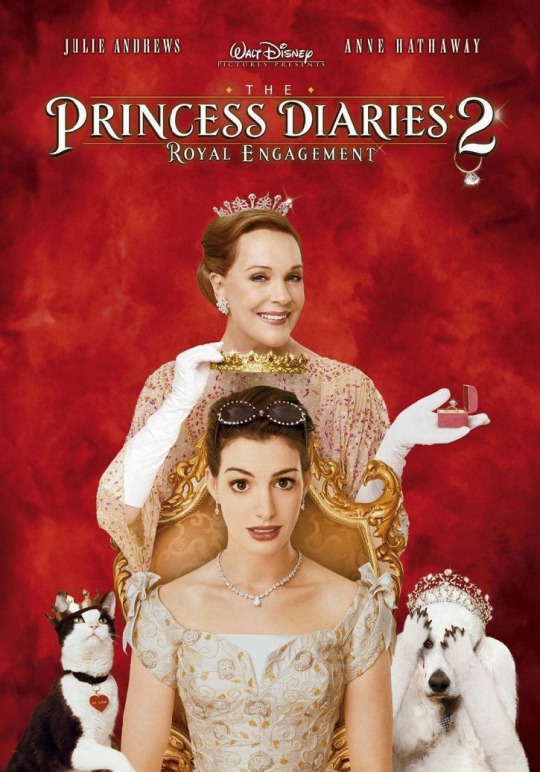
A quick recap of what the story is about: Mia is a 15 year old teenager living in San Francisco with her mother. She's clumsy, awkward and has no self esteem. One day, her estranged grandmother comes to visit her from Europe to tell her that she's the only legitimate heir to rule a small country- Genovia.
Director of the movies, Garry Marshall has Ketu in Magha. Magha is about ancestors, bloodlines and it's also associated with royalty (Magha begins the signs of Leo). Ketu in a chart represents a person's primal creative energy. This explains why he was drawn to a story about royalty. One interesting fact to note is that Gary Marshall made two very iconic movies (Pretty Woman and Runaway Bride) starring Julia Roberts who has been a kind of muse to him and who has Magha moon. This is also a pattern with directors and actors, one example I can think of is Kirsten Dunst (Ashlesha moon, Purva Ashadha Ketu) being a muse to Sofia Coppola (Purva Ashadha moon, Ashlesha Ketu).
Anyways, let's get back to The Princess Diaries and analyze the heart of the two movies- the relationship between Mia and her grandmother, queen Clarisse.
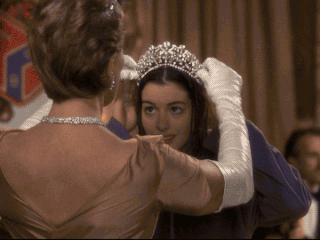
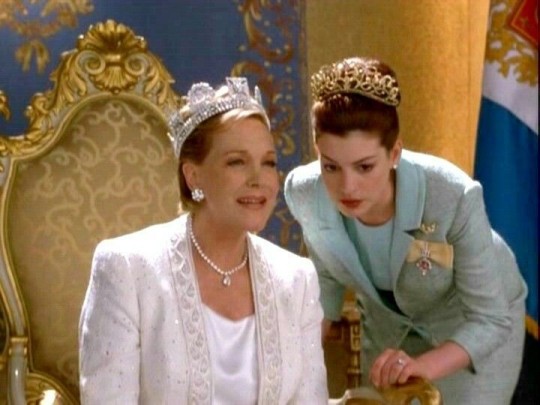
Anne Hathaway - Hasta moon, Vishakha sun, Jyeshta rising
Julie Andrews - Vishakha moon, Hasta sun, Uttara Phalguni rising
SPOILER ALERT
Part 1
Hasta- strong females
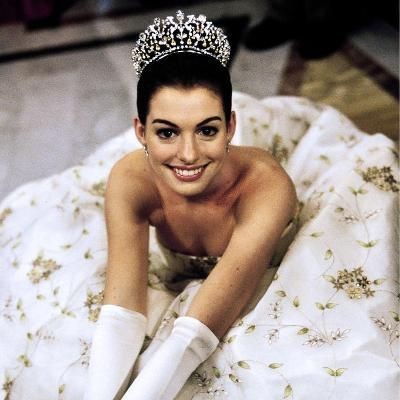
The second movie's main theme is about female empowerment and independence. When the parliament refuses to let Mia rule without a husband, she has 30 days to arrange a marriage and she's willing to do it, just because she wants to rule so much that's she's ready to make such a sacrifice. At the last second she breaks down at her wedding, unable to be betray herself and finds courage inside her to make the parliament change their minds. She succeds and becomes queen without a husband.
Hasta is all about female empowerment but unlike Bharani, it's in a non-sexual, celibate way. Hasta, as a woman, completely rejects almost all male influence and is capable of being self-reliant, only opening up to rare men who she deems worthy. Hasta is the female that does not need a man and in that way, is a safe and empowering place for women.
There's a scene in the second movie where Mia stops the parade to defend a small girl from boys who were bullying her. She tells her how to be a princess and empowers her, letting her and the other kids join the parade. During the monologue at the end, when Mia is talking to the parliament at her wedding, we see women accross the country intently listening to her on the television, shushing the men . 😆
Part 2
Vishakha - joining opposites
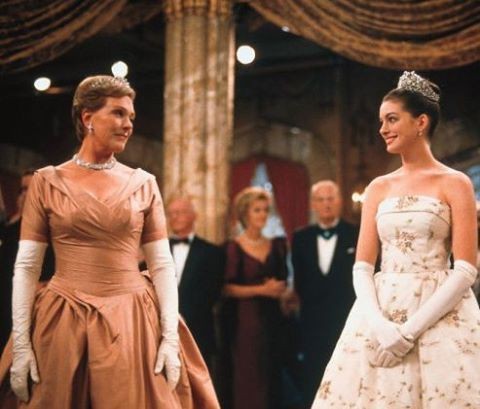
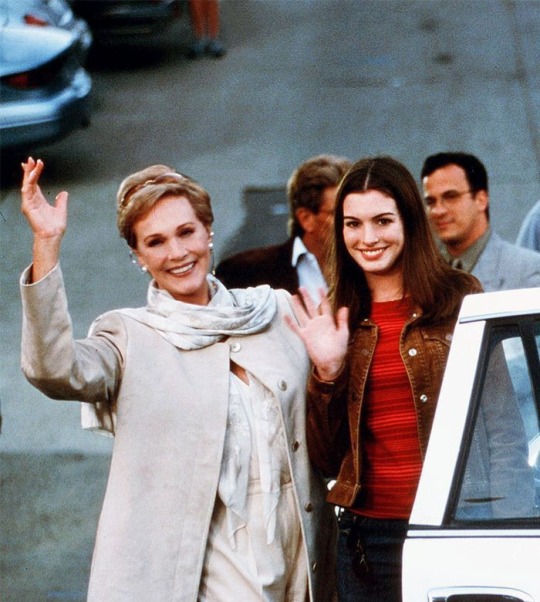
Like Hasta, both Anne Hathaway and Julie Andrews have Vishakha in their luminaries. Vishakha nakshatra is about joining opposites. It begins in the sign of Libra (partnerships, agreements, relationships, compromise) with its last quarter being in Scorpio (death, transformation, occult). Vishakha is ruled by the gods Indra and Agni- the lightning and fire gods. It's about energized ebthuasiasm, cultivating something over time, about using the pent up energy or anger. It's another name is Radha ("the gift", hence the next nakshatra being Anuradha- "after the gift".)
"The gift" is not just good, it can also be unwelcome, like in Mia's case, when she was angered by the revelation that she's a princess. Queen Clarisse and Mia are very different from each other, but neither had a choice but to compromise and agree to a bargain. They learn to appreciate their differences and embrace their similarities, thus, joining opposite forces.
They do have misunderstandings, but that's part of all relationships and eventually they bond deeply as they realize they have the same goal. Vishakha is also connected to anger and the little outbursts they both have definitely show that. One great example is when Mia ruins Lana's (her bully's) outfit and calls her a jerk in front of everyone after always just silently ignoring her remarks.
Joining opposites in this movie is not just about Mia and the Queen, it's also about the two cultures, also about the first movie being a high school drama as well as a fairytale for young girls.
Part 3
Jyeshta - from underdog to the ruler


"Courage is not the absence of fear, but rather the judgement that something else is more important than fear."
-Mia's father to her in a letter
To me, Jyeshta is connected to the underdog who succeeds despite all odds. Jyeshta 's power is to "rise, conquer and gain courage in battle". It's the stage of intense competition. Its deity is Indra- lightning god and the king of the gods, like Vishakha. We see other kids bully Mia in the first film but she slowly places herself above it, making her point (by taking her little revenge on Lana) and then not engaging with them anymore, as she realizes her own self- worth.
A major point in the movie is when she decides not to run away despite being scared to speak to the public, showing her true courage.
Besides Indra- the king of the gods, another deity associated with Jyeshta is Dhumavati- the hag goddess who is eternally hungry. Because of this, I think Jyeshta is associated with grandmothers and our relationship to them. I personally have exalted Ketu in Jyeshta and I was practically raised by my father's late mother (unlike my sibling, mind you. I'm the eldest) and I still have a close relationship with my mother's mother. Mia, played by Jyeshta ascendant Anne Hathaway, also has a very special relationship with her grandmother.
So, in the end, the bullied underdog became a princess and eventually- a queen.
Some bonuses:
Uttara Phalguni is associated with gaining wealth and privileges from partnerships. Uttara Phalguni ascendant Julie Andrews playing queen Clarisse, who became a royal by marriage, confirms that.
Heather Mattarazo (Lily) and Anne Hathaway were born only a few days apart, hence their charts being similar and them playing best friends.
So, this is it. If you found this interesting, please, interact with me, like, comment, reblog. Take care 🤍
#the princess diaries#vedic astrology#astrology#nakshatras#astrology observations#hasta#hasta nakshatra#vishakha#vishakha nakshatra#jyeshta#jyestha#jyeshta nakshatra#jyestha nakshatra#astro notes#astrology tumblr#sidereal astrology#Spotify#magha#magha nakshatra
320 notes
·
View notes
Text
Krishna: a character adored for over two thousand years, revered as one of the most significant political masterminds of the ancient world with his words forming the philosophical core of the country today. Concurrently, he is the god shrouded in inimitable domesticity- as a friend, a lover, and a child. No other deity in the Hindu pantheon has probably achieved as dear a position in the hearts of people as this flute-wielding cowherd of Gokula.
For generations, he has shined as the muse of countless poetfolk, of unfinished business, of unspoken desires and of repressed lovers' qualms. In Meera's longing for her marble beloved, and in Kothai's dulcet dreams of a celestial wedding, Krishna blossoms not as a warrior, but rather as a confidante of young women- the keeper of all secrets.
Curse, o ye, this wedding of devotion,
For I was better off unmarried,
Writes the lovestruck Nawab Sadiq Hilm,
I was well enough at my mother's;
Oh, why did I pine for him?!
Who am I, or what: go ask Rizwan, the gatekeeper
For heaven has been rejected by my forebearers!
He says, in a nostalgic ode to the cowmaids from old tales. To the ones that massage the dust off their feet on Krishna's fevered forehead to soothe his illness, even as the apparent disrespect dooms their afterlives.
Jayadeva notes a more rugged form of Krishna, one that is almost hungry for love. His Radha smiles down upon Radharaman Dutta's kalankini. Of course, she would accept even infamy if it was in relation to her Krishna. However, in time, this epithet has been reclaimed as a celebration of the meteoric, tempestuous love that this unseemly duo had carved out for themselves of the pages of a mostly unwilling history.
Tagore's Krishna is mysterious, eagerly anticipated but rarely seen. Rather, here Radha's pining is crushing and all-encompassing, inherited from Chandidas' virahini. Radha's guttural desire to transform Krishna into herself, subjecting him to the same suffering that she undergoes as a woman in love with a furious ideology more than a man, reverberates eerily against the lighthearted cross-dressing tale of Surdas'.
As often as bards favour the songs extolling the love of the cowherd and the wedded maiden, Krishna's wives are seldom accorded any thought outside of Vasudeva's family tree. Their silence speaks to the stringent rules of a typical patriarchal household. Some of them do speak, and hence Satyabhama becomes conceited and Kalindi wayward. However, the mere few lines that they are mercifully allotted in the text are enough to speak to their resilience. The lines inadvertently hold up a window to the million unspoken words and unexchanged glances. It speaks to the long years, happy and sad. It speaks to the nights of waiting for the beloved to return. It speaks to the quiet lunches in curtained rooms and taste tests in the kitchen.
Each of Krishna's eight wives has their own life, and their own equation with Krishna. Each of their distinct personalities, coupled with their unique introductions to the prince has the potential to bring a distinct flavour to the story of Krishna, the statesman. The understanding that Krishna's heart belonged first to Vrindavana and then to his ambition, must have weighed somewhat on their hearts and yet, the choice to patch up the battle-hardened cowherd, after every blow, sans complaint, and send him out into the world as the architect of history, must have demanded restraint.
The distinct turn of events that brings each of the chief eight queens to Krishna's is quite interesting. Rukmini, the first, demonstrates heart, even if it is born out of desperation. Seizing control of her life, she sends a message, relying solely on rumours of his compassion. Her gamble yields returns manifold as Krishna not only rescues her from an unwanted marriage, but instates her as his chief consort, elevating her, alongside himself, to a divine status. Far from the impulsiveness of her youth, Pandhari's Rakhumai, astute beside her beloved, proudly bears a conch-shell, calling for harmony and community. In life as well, Rukmini brings to Krishna much needed stability, and oversees the blossoming of the city of Dwarika as well as Krishna's growing household.
Jambavati and Satyabhama are given in marriage to the prince by their respective fathers and do not seem to have much of a voice at the time. Jambavati fulfills an ancient destiny, a forgotten promise, then going on to mother the child that ultimately brings about the demise of the Yadava clan. Satyabhama, though often maligned with unfair accusations, is self-reliant. Making no attempt to hide herself from the eye of society, takes her rightful place beside Krishna, not on a throne, but by his side in battlefields. Kalindi however, is an extremely interesting character in Krishna's story. Enmeshed between mortal and divine, she exists as neither. Chancing upon the prince, she unabashedly declares her intentions to be married, and yet she is uncharacteristically silent after her marriage. Lakshmana and Mitravinda, are both won in conquest. They might have been able to sympathize with Rukmini, given their kin had turned against them, on account of their choice of a life partner. Bhadra, on the other hand, has no fancy contests to boast of, or an adventurous rescue. She marries Krishna at the behest of her brother, the only highlight being the arduous journey she undertakes from Kekaya to Dwarika.
After their marriages, these women practically disappear from the narrative until their last moments. We can assume that they were all presumably content with a life outside the spotlight. One can only hope to be privy to their lives after marriage, to know their dreams, nightmares and daily chores. They enter Krishna's life at crucial junctions, and I choose to believe they each had a unique effect on Krishna's worldview, bringing with them a fresh outlook into the mostly stagnant golden city.
#krishna#radha#original writing#mahabharata#hindu mythology#rukmini#satyabhama#kalindi#desi tumblr#ehi murare#prologue#jambavati#mitravinda#lakshmana#bhadra#nagnajiti
178 notes
·
View notes
Text
Unconventional Flowers Event - March Bonus
Dahlias for Holi ft. Nanami

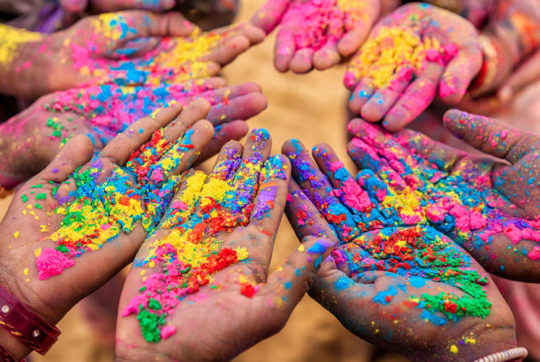

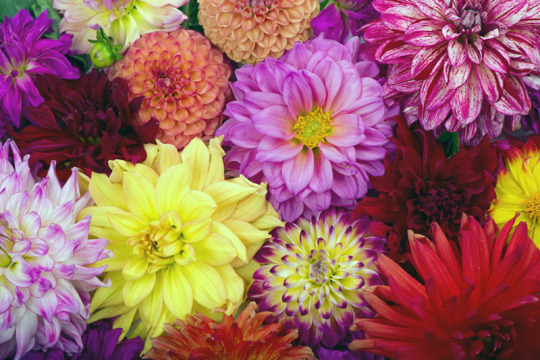
A/N: March bonus prompt for my Unconventional Flowers Event. I honestly was hoping for a very unique holiday and this got my attention in all the right ways. Requested by @sitarawrites. For more information on the Festival of Colors, visit Wikipedia.
Rating: E, fluffy
Pairing: Nanami x reader (Desi reader implied)
Word Count: 971

People had been skeptical of your marriage to Nanami, wondering how you would ever blend your rich, individual backgrounds. For the two of you, it just meant more cultural holidays to celebrate together, and spoiling each other with a wider variety of food and sweets accompanying each one. You knew he’d adapt well, he’s proven that when you were dating, even though Indian festivals tended to be crowded and loud.
And you loved him for the way he kept up the rules that fell on your festival days. Vegetarian food only, and though he didn’t need to, he sat in the back while you offered your prayers, his hair damp because it was customary to always have your hair washed on festival days. The first piece of prasad which you offered to him with love after all the prayers and poojas were done, broken in half as he feeds it to you as well. It was bliss.
But the one festival Nanami refused to participate in was Holi. He had no qualms against the day in general, but rather, the way it was celebrated, by throwing colored water and powder onto others to celebrate the triumph of good over evil. You’d pouted because Holi also celebrated the love between Lord Krishna and his eternal love Radha, the most well-known romantic story in all of Hindu mythology. Not that he hadn’t given it a fair try. You’d told him to wear something old and casual but the man simply didn’t own anything that fell under those categories. He spluttered along gingerly at the fairgrounds while everyone played, his hair weighed down in his eyes by dyed water in shades of shocking pink, electric yellow, and robin’s egg blue.
He hated the wetness, the noise, and the fact that the dyes used in the water and powder didn’t rub off for days (seriously, what was in that stuff?). After his first one which had occurred back when you were both initially dating, he’d politely told you he would not be participating in the ones to come as he tried to rub off the darkening pink that had stained his face, neck, and ears. The color had only taken in more on his pale skin, making him look like he had a bad sunburn, something that Gojo and Yuji had been quick to point out while teasing him to no end.
So it became the rule that he would sit with you during the morning for prayers, and you went with your family and friends to the fairgrounds to celebrate the rest of the day by throwing color at each other. The first Holi after you got married though, you felt a small twinge of sadness that your husband would be absent for this affair but you hid it, pressing a kiss to his cheek before leaving.
When you arrive home, Nanami has laid down a towel trail from the door into the bathroom so that the color wouldn’t drip onto the carpet. You can’t help but appreciate his foresight on this; you loved Holi, but you certainly didn’t want to ruin the carpet. Under the hot spray, you let yourself wash off the colors that stuck to your body, watching them swirl into each other as they went down the drain. Honestly, it was only the pink that actually stuck, the rest of the colors washing off easily. You step out, clean and fresh, and pad into the bedroom, to find Nanami sitting patiently on the bed with a cotton bag in his hands.
“Hey,” you say softly, tired from all the running around at the fairground and now the heat of the shower.
“Hey yourself.” He pats the space next to him. You oblige and sit next to him, the bed feeling soft and comforting after a long, energetic day.
“Did you have fun?” he gently rubs the top of your ear, now pink like a flamingo.
“Yeah. Missed you though.” You lace your fingers with his.
“I know. Your face said it all when you left.” He kisses your hair, now washed and dried, smelling fragrant. “I’m sorry it disappoints you so much. But I just can’t find a way to enjoy playing Holi.”
You turn to kiss his jaw. “It’s not like you didn’t try. And you were miserable the whole time. It’s ok. It’s just one festival.”
“True. But. Maybe you and I can play Holi in a different way? One that involves colors but none of the mess?”
You look at him curiously, wondering what he had in mind before he hands you the bag he was holding. You peek into it and see that it’s filled to the brim with dahlias, your favorite flower.
“Lay back.” You do as instructed, scooting up towards the pillows. Nanami dips his hand into the bag, picking up a pink flower.
“Pink, to symbolize kindness and beauty.” He begins to lay all the pink flowers from the bag across your body shoulder to shoulder, like a devotee worshiping a goddess, and the act causes a rush of love to zoom through you.
“Yellow, for cheer.” He places these across your chest and you hold still, not daring to move lest they fall off.
“Orange, for celebrations and goodness.” These go across your stomach which is now jittery like there are a million butterflies in it.
“Purple for respect and devotion.” The blooms are placed delicately along your legs and you feel giddy from the romance of it all.
You lay there, colors all over your body, which was the whole point of Holi in the first place. Nanami carefully makes his way back up to your face, giving you a tender kiss on the lips, his eyes full of love.
“Happy Holi y/n. I hope this makes up for it.”

All animated lines and banners by @/ cafekitsune
@bleach-your-panties @bleachbrainrotbro @kr0wu @grimmjowssoulmate-blog @j-u-u-z-o @brittscafe @keiva1000 @buttercupbitches @vee33ee @cindyneko-strider @dreaming-about-seireitei @quinnyundertow @naoyagasm @sitarawrites @sehunaeri @kentosgirlie @strawberrymuffinlovin @ickkck-09 @connorsui @arabidp0ssum @teasore @un-aesthetic @jadedjane
#nanami kento#nanami kento x reader#nanami kento fluff#jjk nanami#nanami fluff#nanami kento x you#nanami kento x y/n#kento nanami#kento nanami x reader#desi reader#desi tag#nanami kento x desi reader#vee writes#unconventional flowers event
75 notes
·
View notes
Text
After Krishna left for Dwarka, Radha used to keep herself a lot busier than usual; doing her chores back in Vrindavan, talking to the trees finding Krishna in everything, taking care of the people and animals. At night she would go to her room and sit in front of the mirror, sigh and take out her shringaar. Tonight, as soon as she looked into her reflection, it was her Kanha smiling at her.
"How's Dwarka dheesh doing?" she carefully kept her tone as teasing, afraid that if he suspects even a little bit of sadness then he will come running to her right away, leaving everything behind
"Oh please, Radhe. You should come sometime, you used to before but you barely do now."
Radha cupped Kanha's cheek in the mirror
"My sweet mohana, you know I can't. It's my duty to give you and your ashtabharya all the space and love," laughing, she added a little wistfully "As it is I don't really have a good reputation out here. Krishna's lover. But why? Krishna has millions of lovers. The whole brahmaand is his lover. Why worship one exclusively with him? If he loves all his lovers equally then why just worship this Radha with him? She isn't even his wife. Unlike Mahadev and Parvati, they aren't even legitima-"
"Radhe." Krishna stopped her with tears in his eyes
Radha, hurting as much as him, apologized and continued "but it is true, my love. People only view love as black or white. They think marriage is sanctity when it is the bond that is. Not the label."
Nodding, Krishna whispered "do you miss me?"
She laughed till there were tears in her eyes too "Oh Kanha, you are everywhere I look. Every time I breathe."
"Then why talk to me like this? Why summon me here?"
"Because you are everywhere. Everywhere but right here."
Kanha's eyes softened "I am within you, sakhi. Always."
Nodding and smiling, she looked away to wipe her tears "yes yes, I know that." she looked back in Kanha's eyes "only if I could somehow tell that to Yashoda maiya, Nand baba and all the gopiyan and people here. Maiya is inconsolable, kanha. She cries and says 'that boy always tricks me. I saw the universe in his mouth when he was a child. Now wherever I look, I see him. But I just want him to come steal my makhan. Kanha, where are you? I promise I'll never scold you.'
Krishna touches the mirror ever so gently
"Kanha, they think you are not real when you are everywhere. They think it's an illusion and all they do is weep."
"But they forgot that Maya is Krishna and Mohana is Krishna. Everything that involves krishna is as real as the morpankh falling from the sky quietly into their palms when they think of Him." Radha and krishna whisper at the same time
"Tomorrow the Pandavas and Kauravas fight and I'm Arjuna's saarthi. After killing Kansa mama, the trajectory of my life has changed completely. But I miss Vrindavan, Kishori. I honestly don't even know what to do. They call me God but forget I'm a human in this avatar too. All I can feel is Gandhari's pain. Even if she hates me with everything she has and cursed me for my existence but I just can't help but feel for her so deeply. What can I do?" he sobs
"What Kauravas did was wrong but Gandhari is a mother, kanha. Her pain can't be measured. It is unbearable but justified. But so is your karma and dharma. Whatever you do will be remembered forever. They all need you. So go, sakha. Do what needs to be done. I believe in you. I love you. We all do."
Krishna smiled through the tears
Radha whispered "we parted physically to fulfill our dharma in this lifetime but you know? I.. I'm just so tired, Kanha. It's been so long. I just want to go home. To Goloka. Our home. I feel my purpose here is coming to an end..."
"So is mine, Radhe.. so is mine. We are One." Kanha clutched the mirror closer to his chest and Radha did too - both of them in an eternal embrace.
"We will go home very soon. To everyone we love, finally. It's my vachan, sakhi."
#desi aesthetic#desi tag#desiblr#desi#desi culture#desi dark academia#desi stuff#desi academia#desi girl#just desi things#radhakrishna#krishna#krishnablr#gopiblr#radha#mahabharata#narayana#lakshmi narayan#bhagavad gita#bhagavatam#kanha#desi thoughts#desi things#growing up desi#hindu mythology#hindu gods#indian culture#raas#janmashtami
166 notes
·
View notes
Text
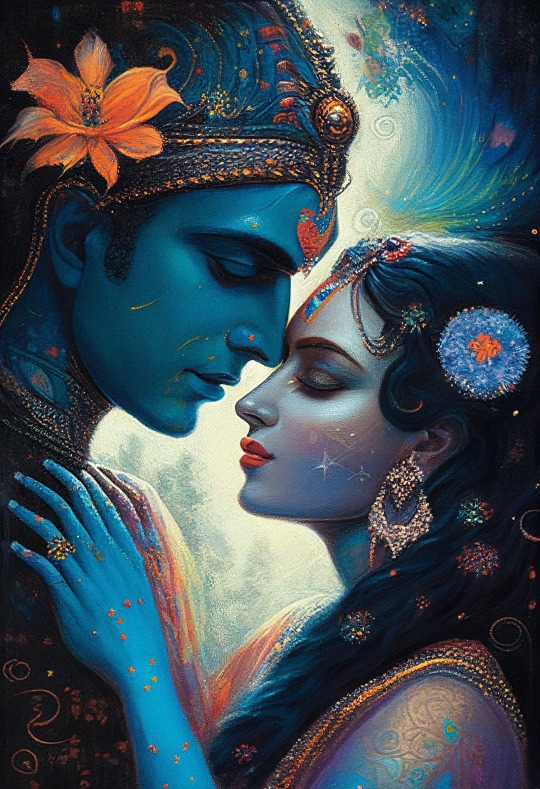
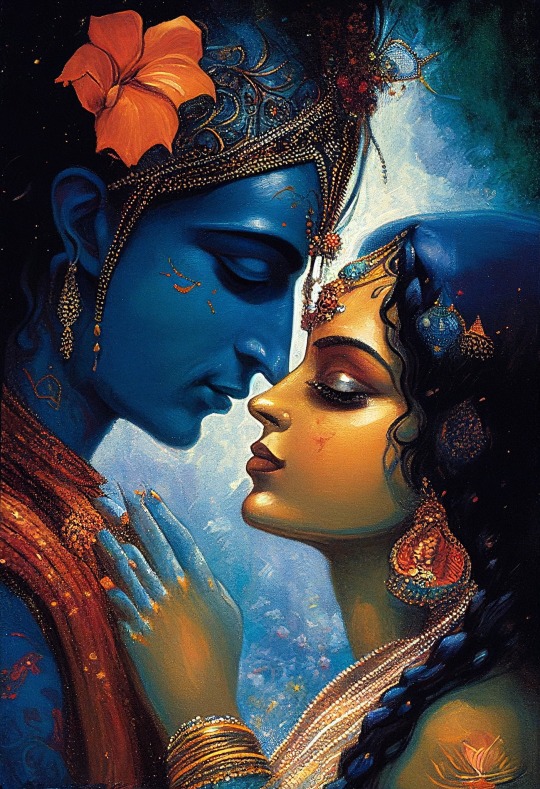
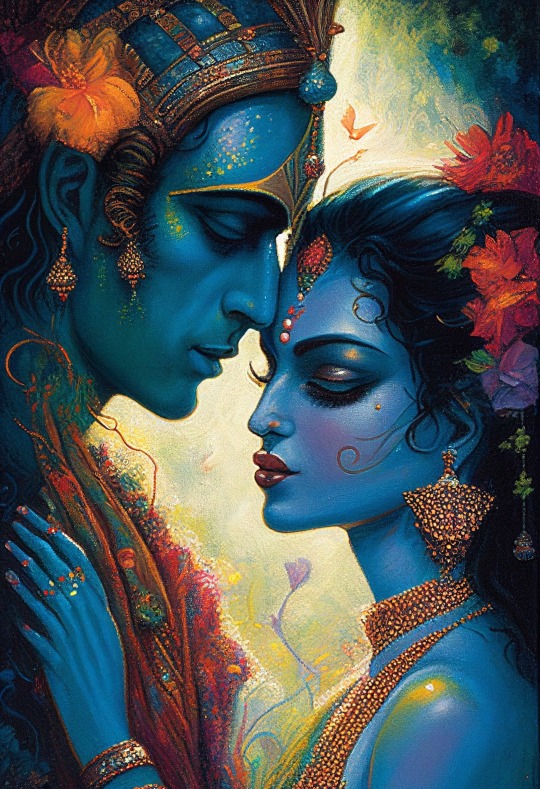
Divine Union of Lord Vishnu and Goddess Lakshmi
It is said that we reach where our thoughts lead us to. So, if we are surrounded by positive thoughts we will attract positivity and if our thoughts are related to divine energy then positive aura is the ultimate destination.
Let us revive our mind and nurture it with sacred things about god and goddesses who are the real foundation of this universe.
Hindu religion is the richest one loaded with a huge number of gods and goddesses. Among many, the tales of Lord Vishnu and Maa Lakshmi are very popular among Hindu devotees throughout the world.
Lord Vishnu along with her consort Maa Lakshmi is regularly worshipped by people for their eternal blessings in the form of good health, wealth, success, prosperity and harmony in the family.
About Lord Vishnu and Maa Lakshmi
According to the various Hindu texts, puranas, and epics Lord Vishnu is the part of trinity gods who play the role of preserver. The other two gods are Lord Brahma (the creator) and Lord Shiva (the destroyer). Lord Vishnu is the sacred Hindu god also known as Narayana who used to appear on earth to maintain a balance between the good and the evil and to protect humans and other beings from the wicked demons. Lord Vishnu has appeared nine times on earth in the form of different incarnations during the times when bad deeds increased.
Maa Lakshmi also known as ‘Shri’, the Hindu goddess of wealth, health and good fortune who is the wife of Lord Vishnu. It is believed that she also appeared in different forms on earth along with Lord Vishnu as Radha or Rukmini, Sita, Padma and more.
Both Lord Vishnu and Maa Lakshmi possess powers which are capable of transforming the lives of people. When they both are worshipped together miracles happen and the desires of people are fulfilled. They bless their devotees with abundance of health, wealth and prosperity.
Marriage of Vishnu and Lakshmi
The union or the tying of knots between the Lord Vishnu and Maa Lakshmi is an auspicious moment altogether. Lets dive into the esoteric journey of sacred marriage and bring out some best of the gems.
The story goes back to the time when Indra (the King of all Devtas) was traveling on his vehicle Airavata, the elephant. He met sage Durvasa on his way who gave him a magical garland. Indra in his arrogance did not greet the sage properly due to which sage Durvasa cursed him. As a result of which Indra and all the other devtas lost their power, wealth and possessions.
After this, devtas were attacked by Asuras the demons. In the battle they lost Indralok and other powers.
Indra along with other gods went to Brahma who advised them to visit Lord Vishnu in Vaikuntha.
Indra pleaded in front of Lord Vishnu and asked for help. Lord Vishnu advised them to go for churning of the ocean of milk that is 'Samudra Manthan'.
Lord Vishnu told the gods to take help of Mount Mandara for churning and snake god Vasuki as a rope.
Lord Vishnu himself appeared as an incarnation of Kurma avatar in tortoise form. As Kurma avatar, Lord Vishnu went into the ocean below the Mount Mandara and held it on his back providing a firm base.
This was the time when Lord Vishnu and Maa Lakshmi parted.
On the advice of Lord Vishnu, Devtas went to hold the tail of Vasuki and the Asuras were towards the head which was throwing out a deadly poison.
As the churning began, many precious gems and other things came out. Goddess Lakshmi also appeared in a beautiful form all dressed up in red saree and loaded with gold jewelry. All the Devtas and Asuras were awestruck by the beauty of goddess Lakshmi. They eagerly waited for Lakshmi to choose them when Lord Brahma interfered and organized the 'Swayamwar' for the marriage of Lakshmi. This was done to protect the rights and respect of women as in Swayamwar, goddess Lakshmi had the right to choose her husband.
Devtas and Asuras were admiring goddess Lakshmi and wanted her to choose them. Just then Lord Vishnu also appeared and posed as one of the grooms. The moment goddess Lakshmi saw Lord Vishnu, she ran with a garland towards him and chose him as her husband.
This was the moment when goddess Lakshmi tied knots with Lord Vishnu and became his eternal consort. Lord Vishnu and Goddess Lakshmi Talon Abraxas
46 notes
·
View notes
Text
My thoughts on the Amrita-Raj-Raadha love triangle.
Am I the only one who doesn't feel sorry for Amrita? She wanted this. She willingly entered a relationship with an already taken man. She knew he loves another and yet still pursued him, wanting to break Raj and Raadha up for the sake of her own selfish desires. She placed herself in this position of being a third wheel by standing in the way of two people who genuinely love each other, making everyone around her miserable in the process because she wanted to flex in front of the others of being Mrs Doobay. Yes she has a huge crush on him and is physically attracted to him but she also wants the prestige, position, wealth and influence that come with being his wife. I understand that she was still a "child" when the engagement happened, so I don't fully blame her. The true weight of the blame rests on her much older brother's shoulders who blackmailed Raj into this marriage and should know better as a significantly more mature and experienced individual than his adolescent baby sister. I understand that arranged marriages were common back then and he probably just wanted to secure a good match for his sister in order to make sure that she is well taken care of and her future is secured, but the way he went about it was shady AF and he should have realised, even back then, that he would be setting up his beloved little sister for a life of dissapointment, emotional neglect and heartbreak. Just imagine if the genders were reversed and it was Amrita who is being manipulated and emotionally blackmailed into a marriage and sexual relationship with a guy she doesn't want because she is already in love with somebody else. Would we still pity the guy who is forcing himself on an unwilling and resistant girl, saying that she should give him a little bit of a chance and treat him better? I don't think so. In my opinion, the true victims in this situation are Raj and Radha who truly got the worst of it. As far as Amrita is concerned, I think it would depend on how much she knew about her brother's role in all of this or whether she even approved of his scheming. But if she knew and still went along with it, then that's on her.
33 notes
·
View notes
Note
Still wanting to know what happens next in Distance. Waiting, waiting, waiting. Give us a hint of what we can expect, please!!
it took me a while to get to this one, sorry love x.x
but hello! yes! thing is, there's a priority list i had for my major fics, based on my inspiration and how quickly they were getting written, and the order was something like this:
1. the assassin!deva & prince!varadha au 2. sandalwood & ozone (which might get renamed) 3. this fic 4. the twins! deva & devaratha au (which i tried to shift up in the list, but i realized the hard way that i should listen to my brain) 5. distance
so,,,lmao
it might take a while to get around to it, especially because i feel like i left it in a pretty good place, and it doesn't need my immediate attention, even though i have most of it's plot fleshed out
what i can tell you about it though is:
in distance, deva and varadha have known each other since childhood, but haven't gotten the chance to get as close as they are in canon, seeing as to how they're from different kingdoms entirely deva is betrothed to radha rama in this one (shocking, i know) and there's suddenly a change of plans, leading to his marriage with varadha – a last resort to fix an unexpected situation we know that there's this tension between them, especially from varadha's perspective, but we don't know what went wrong and when it happened, so we'll hear a lot about their pasts, and get to see a lot of complex dynamics between two people who have yet to learn the 'language' the other speaks, while navigating the complexity of a marriage that involves not only them, but two kingdoms. and, it's omegaverse. :D
#basically: canon varadeva are so solid because they understand each other perfectly#but what if we put them back at square one and threw something into the equation that would start them off on VERY rocky ground?#hope this was a somewhat satisfying hint#but ty for the ask anon ^^#salaar#varadeva
22 notes
·
View notes
Text
Gold Rings and Black Roses Pt 4
pt 3 here
-
On the fourth day Aadhya tries her luck in going outside. It’s been a while since she’s been exposed to direct sunlight, staying inside the house all these days. She walks up to the main door cautiously, but the men standing guard don’t even look at her. Now or never, she thinks, and takes a step outside. When she isn’t immediately shot, Aadhya slowly makes her way down the steps outside of the mansion until she gets to the gravel road. Here she notices the outside guards staring at her, but they make no move to bring her back inside, so Aadhya keeps walking, turning to see the mansion from the outside.
Somehow it looks a lot less scary now than it had when she was first brought here, though that was because Aadhya had thought she was being led to her death then. She’s no architecture buff, but she thinks it’s beautiful. She’s also more familiar with the inside of the mansion now, both in terms of the layout and the people. Aadhya’s made friends with some of the women working for Radha Rama, especially the tall one that gives her clothes to wear for the day, Sara. She’s spent a few hours every day talking to Sara and the other women about her life in America, and listening to their stories of Khansaar. She’s come to the conclusion that Khansaar seems like a terrible place to grow up, what with the constant threat of being murdered, but maybe Aadhya’s just soft. Sara had spoken of it with barely concealed longing, and Aadhya had sympathized with being stuck in a place far from home. She didn’t sympathize with the rest of it, though.
“I miss Khansaar’s government,” Sara had said last night. “Here in India, there’s way too many laws against killing people,” she scoffed.
“...I think that’s the case in every other country in the world actually,” Aadhya had replied.
Aadhya thinks about the rest of the conversation as she walks around the building, taking in the sights around her. She had gotten Sara and another woman working for Obullamma, Rohini, to spill about Radha Rama’s ex-husband.
“It was a political marriage, Bhaarava was a powerful warrior and Raja Mannar wanted him in his control,” Rohini explained.
Sara nodded. “And of course ammagaru didn’t oppose the marriage, she was willing to do anything for her father.” Rohini gave her a look. “Well, she wasn’t opposed to Bhaarava either,” Sara continued cautiously, looking like she was nervous of Radha Rama appearing behind her. “He was attractive, competent, and knew how to play the game of politics. Ammagaru… really liked him.”
Aadhya frowned. “Then what happened? Did he die?”
“Well yes, just after he was exposed as a Shouryanga spy,” Rohini spits.
Aadhya perks up at the familiar name. Was this man related to her too??
“But Deva killed him and many of his soldiers in his quest to hand Varadha the throne.”
Oh. Probably not, then.
“Good riddance,” Sara says. “He betrayed our ammagaru, that pig. Even before he went for the throne, he sided with Rudra against her during the ceasefire.”
So Radha Rama probably only felt resentment towards her ex-husband, Aadhya thinks as she makes it to the other side. She gasps as she realizes the back of the building is a huge garden, plants clearly only recently trimmed and wrangled into place. Delighted, she runs over, examining the different plants. She has no idea about the differences between the flowers, but she thinks they’re very pretty. Further along the path are ornate benches to sit on, and carved statues. There seems to be a fountain in the distance, in the center of the garden.
Aadhya loves it.
She spends the next hour exploring, and just enjoying the fresh outside air. Towards the end of the hour, she spies a cluster of beautiful black roses. The petals of the roses are pitch-black, looking almost alien amongst the rest of the white lilies and jasmines surrounding them. As she brushes her hand through them, Aadhya’s reminded of the black saree that Radha Rama wore on the first day she saw her, before she changed into the yellow one. She tilts her head, considering. Actually they remind her of Radha Rama in general. She knows there’s probably a superstition about black roses somewhere, that they represent mourning and loss, but beyond that Aadhya can see the elegance and mystery that surrounds the flowers, much like Radha Rama herself. Even though she was in mourning, and had been for the last seven years over her husband, her kingdom, and her father, Radha Rama had stayed strong throughout, still managing to be so regal despite her situation.
“Aadhya Krishnakanth.” Aadhya jumps as she hears a voice behind her, turning to find a bored man looking at her. “You are expected for lunch in ten minutes.”
“Oh, I’ll be there then,” Aadhya says, and it looks like the man is satisfied as he walks away.
She turns back to the flowers. Has Radha Rama ever received a bouquet of flowers in her life? Was Bhaarava the type to pamper her? Aadhya frowns as she thinks back to what she’s heard about the man. Probably not. She makes her decision, plucking a handful of black roses from the ground. She looks around and spots someone that looks like the gardener, digging a few yards away from her. Aadhya makes her way over to him.
“Hello!” She attempts a friendly greeting. The man, who was muttering angrily to himself, turns to look at her.
“What do you want,” he sneers.
Aadhya’s taken aback by the blatant hostility emerging from this man, but soldiers on regardless. “So sorry to bother you, but could you please dethorn these roses?”
The gardener stares at her. “...Aren’t you the kidnapped girl?”
Aadhya squirms. “Yes?”
He looks at the roses in her hand, then back up to her face. “Who the fuck are the roses for? You’ve been here for less than a week and you want romance?”
She blushes. “Radha Rama, actually.” He stares at her some more, then a grin spreads across his face.
“I want to see this play out. Give me the roses.” He pulls a device out of his back pocket, overflowing with other gardening tools, and proceeds to clip and dethorn the stems of the roses. He hands them back to Aadhya when he’s done. “Here you go. Hope you go out quickly.”
“...Thank you,” Aadhya says, and tries to walk back inside as fast as she can. She knows she’s impulsive, but hopefully this doesn’t backfire on her as much as the gardener clearly thinks it will.
-
Aadhya enters the dining room with the flowers held behind her back, wanting it to be a surprise. Radha Rama is already seated at the other end of the table as is their usual arrangement, scrolling through her phone. Aadhya had successfully convinced the older woman to download a few social media apps yesterday, but not before Radha Rama had gone through every sentence of the terms and conditions for each app.
“I am not giving a random businessman my private information,” she sneered. But Radha Rama had seemed to find Twitter funny, which Aadhya counted as a win, as she believed getting the older woman on the Internet was the best way to integrate her into general society. She wasn’t royalty anymore, and it wasn’t healthy for her to hold onto that grudge for so long. Aadhya hoped Radha Rama would learn to have some fun soon.
Radha Rama looks up at Aadhya’s entrance, raising an eyebrow at Aadhya’s hidden hands. “Are you going to try to shoot me?” Aadhya… decides not to be offended at how relaxed she is under the assumption that Aadhya has a gun behind her back.
“Nope. I brought you a gift.” Radha Rama blinks in surprise, and Aadhya shoves her nerves down. She presents the loose bouquet of black roses, holding them out in front of her like a shield.
When Radha Rama keeps staring at the flowers, Aadhya shifts on her feet. “I got you some roses from the garden. They’re black, and I thought of your saree, and also how cool you are…” Aadhya trails off as the older woman looks up at her, eyes piercing through her.
“You got me roses?” Radha Rama’s voice is hoarse. “Because of… how cool I am?”
“Well yeah. You haven’t killed me yet, and you’re mysterious and beautiful just like these roses.”
Radha Rama lifts her arms to take the bouquet, gently stroking one of the roses as she inspects the flowers.
“Radha Rama?” Aadhya asks. “Do you like them?” Aadhya hasn’t ever seen Radha Rama this unresponsive, and she’s nervous.
“Rama.” The older woman says, and there’s a hint of a shy smile on her face now. “Call me Rama. It’s what my dad and-” she stops herself. “It’s what my dad used to call me, and it’s the name I prefer.”
“Ok,” Aadhya says, relieved that Rama doesn’t hate the gift. “Rama, then.”
“I like the roses,” Rama says mildly, but Aadhya can see the blush high on her cheeks. Oh. Aadhya had done that, had put that blush there. Her heart starts to beat faster as she realizes her crush may have the remote possibility of being requited.
Rama turns her head to the doorway. “Obullamma!” she calls. When the woman comes in, Rama hands her the flowers. “Put these in a vase in my room.”
Obullamma gingerly takes the flowers and leaves, not before shooting Aadhya a look, a mix of jealousy and bewilderment. Aadhya tries not to do anything as childish as sticking her tongue out at Obullamma.
Rama turns back to Aadhya, then sits back down, gesturing for Aadhya to take her seat. “Let’s eat,” she says, smiling. Aadhya obeys, feeling very much like she’s accidentally rolled a Nat 20 on a charisma check.
The lunch tastes exceptionally good that day, Aadhya thinks.
-
Bilal finds Aadhya in her room sometime in the evening.
“You gave flowers to WHO?” he asks incredulously as he enters.
Aadhya sets aside the book she was reading, a political text that Sara had given her. She found it boring, but apparently it was a childhood favorite of Rama’s. Aadhya can unfortunately see that, all the talk about authoritarianism and the duties of a centralized government was right up Rama’s alley.
“I gave them to Rama.” She shrugs, but can’t help the flush that runs through her at the thought of Rama’s smile at the gift. “She liked them.”
Bilal stares some more. “Is this my life then? Am I to spend the rest of it running after Shouryangas who fall in love with Mannars?”
“Bilal!” Aadhya blushes. “No one’s in love with each other.”
Bilal scoffs, clearly disbelieving. “Uh huh. And you’re secretly Amma’s favorite child. Right.” He sits at the edge of her bed, keeping a respectable distance. “Whatever you’re doing to keep Radha Rama on your good side, keep doing it, but don’t get too close. Do whatever you can to get yourself out of here, then run. Don’t look back. Don’t come back. Forget about Khansaar and your biological family.”
Aadhya frowns. Her first instinct is to defend Rama, but she remembers that she’s here because Rama did have her kidnapped. But that was only to get Deva here, right? “Well, what’s the update on Deva? I’m here because of my brother, right? When’s he supposed to get here then?”
Bilal shrugs, looking uncertain. “I’m not sure, thalli. But when he does come, you should escape with him. He’s not going to let Radha Rama live when he realizes she’s kidnapped his little sister.”
“You assume he’ll care,” she mutters under her breath, but Bilal hears it. “Oh no, thalli. If Deva truly sees you as his, he’ll protect you in any way he can. He’ll tear Radha Rama to pieces if he needs to.” When Aadhya looks up, ready to protest, Bilal sighs, and lifts a hand to stop her. “You can’t protect her from him, Aadhya. You only know her good side. Deva has seen her at her worst, and if he realizes she was initially trying to set him up to kill Varadha, he’ll be even more angry.” Aadhya remembers what Bilal had told her days ago, about how Deva had beheaded a lord for daring to grip Varadha’s collar. “Think about it. That’s all I ask. Try to save yourself, Aadhya. If not for yourself, at least for your father who’s probably very worried.”
Once Bilal leaves, Aadhya lapses into thought. Deva, with his history, has every right to kill Rama, and it would be the smart thing to do for her to use the opportunity to escape. But Aadhya realizes, with a jolt, that she really doesn’t want Rama dead, that she’ll truly miss the woman. She resolves to try to negotiate with Deva, whenever he shows up, bargain for Rama’s life somehow.
-
Late that night Aadhya goes back outside. The skies are clear and she wants to see the stars, suddenly feeling homesick. As she tilts her head up to the sky, letting the vastness of space calm her down, she spots a familiar figure sitting on the roof. What was Rama doing up there? She wonders, but if Rama’s up there it means the guards will let her go up there. Aadhya finds the stairs that lead to the balcony of the mansion, giving an awkward wave to the unamused man standing on patrol near the staircase. She climbs up the stairs, then climbs up the ladder that leads to the rooftop.
Rama turns her head to the side slightly at Aadhya’s approach, but seems to realize who it is and relaxes, facing forward again. Aadhya takes the opportunity to observe Rama from the back.
The older woman is still in the red Banarasi saree she was in this morning, patterned with silver diamond designs. Aadhya absentmindedly wonders what her pajamas look like, or if she sleeps in the sarees she wears all day. Rama’s thick curls are gathered into a french braid, falling beautifully down her back, and Aadhya blushes as she realizes one of the black roses she picked this morning was carefully placed in the center, surrounded by silver earring chains. Rama’s still sitting as straight-backed on the roof as she does in chairs, but the set of her shoulders seems more relaxed than usual. As Aadhya sits next to her, crossing her legs, Aadhya’s breath catches as she observes the way Rama’s face gleams in the moonlight. The soft white light turns the hair in the front silver, making it look almost like a crown.
Rama glances at her, brown eyes shining from the moonlight. “Couldn’t sleep?”
“I wanted to see the stars, so I came outside. Then I saw you up here, so I came upstairs,” Aadhya explains.
Rama nods. “The stars are beautiful tonight.”
Aadhya just barely stops herself from responding to that the way she really wants to. “Yes, they are,” is what she replies with instead. “Is this a habit of yours? Coming outside to stargaze at night?”
“I never did anything as simple as stargazing in Khansaar, no.” Rama sighs. “I was too busy for things that weren’t related to politics. It was always ‘Rama, there’s a rebellion that needs to be put down in one of our territories, authorize the military’, or ‘Rama, can you go sort out whatever’s wrong with your brother’, or ‘Rama, your husband didn’t show up to the lords meeting today, find out what happened’. I was my father’s finest weapon, and I’m proud of it. But in the grand scheme of things, does all that I did even matter? If the owner of the weapon is dead, then what good is the weapon?”
She leans back a little, closing her eyes. “That bastard brother of mine didn’t even give my father an honorable death. Decapitated him right in front of everyone, then went and sat on the throne like it was his birthright. Of course that boyfriend of his slaughtered everyone on his way to the throne, then offered the crown he picked off my father’s corpse to my brother.” She swallows, and Aadhya can hear a deep bitterness in her voice. “It was still stained with my father’s blood when your brother crowned mine, did you know that?” Aadhya can only shake her head. “All those years Raja Mannar still kept that boy in his heart, even after he threw away my father’s greatest gift. He wanted to make him a lord, was willing to upset the Ghaniyars for it. And what did Varadha give him in return? Nothing. He kept taking and taking until he took what mattered most to my father.”
The two sit in silence for a few seconds, Aadhya thinking about her response. She doesn’t want to anger Rama, doesn’t want to ruin the vulnerable mood between them, but as a neutral observer she thinks Raja Mannar is also very much in the wrong.
“Your father shouldn’t have punished him so harshly for what he did as a child,” Aadhya says hesitantly. Rama looks at Aadhya sharply, but Aadhya decides to keep going. “Not to mention killing Varadha’s friend’s entire family, and turning a blind eye to Varadha’s suffering all the years after.”
Rama scoffs, quickly standing up, and Aadhya’s stomach turns. Oh, now she's done it. All the times she kept pushing, hoping that Rama would be charmed by her instead of offended, and now the worst has actually happened.
“Of course you’d take his side,” Rama hisses at her. “You’re one of them Shouryangas too. I don’t know what I expected from you.” This is the first time Aadhya has seen Rama angry, and the shock is made worse by the fact that it’s directed at her.
“Rama wait! I have nothing to do with the Shouryangas, I just got here! And I can’t just blindly take your side either,” Aadhya tries to explain.
“No.” Suddenly the anger is gone, replaced by sadness. “No you can’t.” Rama wraps her arms around herself after a sudden cold gust of wind, and Aadhya’s horrified to realize that she looks close to tears. “No one takes my side, not even my own brothers, and not even my own fucking husband.”
“Rama…” Aadhya trails off, not knowing what to say.
Without another word, Rama turns and descends the ladder.
Aadhya stays up there for a few more hours by herself, feeling miserable and even more homesick than she was when she first came outside.
-
@illusions-of-serendipity @just-a-lazy-person @nini9224 @recentinterest @omgdontlookatmeuniverse @greatkittykoala @theimmortalprince
30 notes
·
View notes
Text
Favourite moments in Kali Flame of Samsara : March 2024 Update:
S1E9: The Language of Pain
Pt4: Saraswati romance path:

I dont think we talk much about how Radha is an awesome sister. Ik this is like the bare minimum for a sister but looking at the times, she is amazing for that. And also she is looking sooooo pretty😭😩🛐.

Their reactions to each of their marriages 😔.



Ok but I like Saraswati's smirking sprite so muchhhhh😩.

I love the writing style and the description of Sara and Devi's feelings a lot. And I really like Sara's plan haha.


Remember when Rati Banerjee's food was "mysteriously" poisoned. Looks like someone again will now finally die.


"Your flame is starting to burn with particular intensity." Asdfghjksksksksk cant wait for this flame to burn down the societal norms with Saraswati uggggghhh.
This scene>>>>>
#romance club#rc kali: flame of samsara#rc kali flame of samsara#kali: flame of samsara#kali flame of samsara#kali fos#rc kfos#kfos#rc kali series#diamond rush#rc diamond rush#rc deviya sharma#rc devi#rc saraswati basu#rc saraswati
19 notes
·
View notes
Text
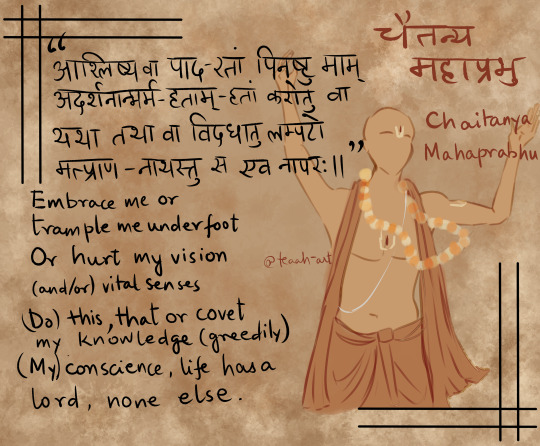
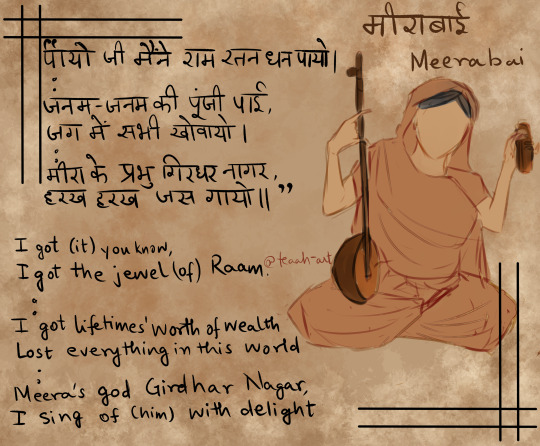
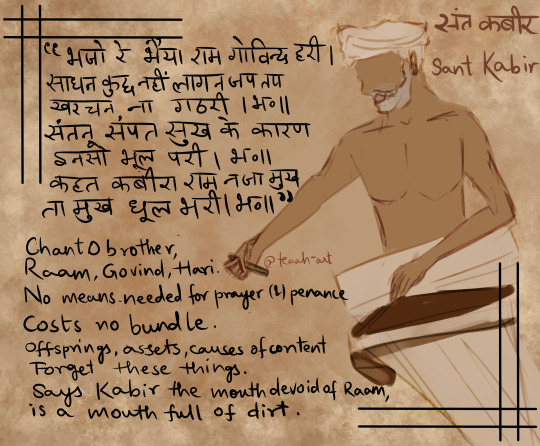
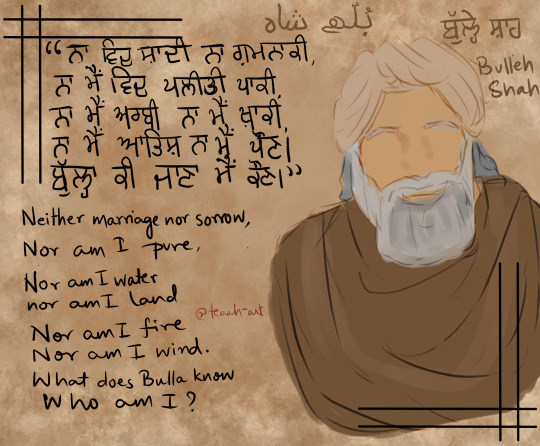
Desi LGBT Fest 2023 (hosted by @desi-lgbt-fest)
Day 7 : Faith/Rituals of Love
Definitely geared heavily towards the 'Faith' part of this prompt as soon as I read it!
If being Queer is defying conventions and if being a part of the Queer community means going against heteronormativity and gender conformity, is it not Queer to forego materialistic ties and the love of a human partner and embrace the love of a greater being you have only heard about in stories?
All four individuals featured here were integral part of the Bhakti Movement and/or Sufism in South Asia. None were married other than Meerabai.
(Panel order from top to bottom)
Chaitanya Mahaprabhu (1486-1534) : A key name of the Bhakti Movement and the Gauriya Vaishnav tradition in 15th Century Bengal, Chaitanya Mahaprabhu was believed to have been a vessel for both Radha and Krishna. Bengali doesn't use pronouns or gendered language and we may never know what they would have preferred to be identified as in a language they didn't know (English), I will simply resort to using They/Them for them. Their written teachings are few and far between but the verse mentioned here is the seventh verse of the only written record of their teachings, the Shikshastakam - a collection of 8 total verses. The translation here is my own and quite literal so that the interpretation is left to the reader.
Meerabai (1498-1597) : [CW : IMPLIED QUEERPHOBIA/APHOBIA] Meerabai was born into Rajput royalty and was married off, also to Rajput royalty, in likely an arranged marriage. While most of the stories surrounding her are folklore whose historicity is yet to be confirmed, her marital status can be confirmed, and so can her devotion and affection for Krishna and the divine, which she has herself penned in numerous poems and songs. Folklore does strongly imply that she was non-committal to her marriage and that her in-laws tried to poison her to death multiple times for it.
Kabir (1398–1448 or 1440–1518) : Found as an orphan by a Muslim weaver couple, Kabir's religion grew to become somewhat of an enigma for future generations. His stance, however, on the topic romance and marital relationships is quite clear - he looked down upon them and a huge chunk of his couplets strongly imply that romantic and sexual relations simply obstruct spiritual enlightenment.
Bulleh Shah (1680-1757) : Bulleh Shah, though an ardent proponent of loving the divine, was declared a Kafir, a non-believer/non-Muslim by a quite a few Muslim clerics of the time. He was known for speaking up against existing power hierarchies of the time and used vernacular speech for his writings (Punjabi, Sindhi) which not only served to popularize his works, but also let people connect to his words.
A personal note on my motivations under the cut.
A while back when I was actively going through the anxiety of finding out that I am ace and that I will never fit into the current South Asian society that the wedding industry has a chokehold on, I desperately wanted to see people from my own culture living happily without a partner. During one of my history rabbit hole escapedes, I restumbled upon the story of Meerabai, how she always insisted on loving and devoting herself towards Krishna, despite being married into a normative and wealthy household and despite her in-laws repeatedly attempting to poison her for not committing to her husband. Most of us from India grow up hearing about Meerabai, her spiritual connections to Krishna, and her struggles. The moral of those stories is always framed as 'believe in god, he will help you through tough times'. But this was the first time I was making a different connection, I was drawing different morals. And when I took Meerabai's non-conformity to her married life and started looking for more examples like hers, I was overwhelmed by how many more individuals existed without a partner, condemned being in a normative, married relationship, admitted to having lost human connections and faced resistance even, and yet stayed true to their orientation and sounded HAPPY! It was extremely hard to narrow it down to these four, but these do make my point! Labels are hard to transpose across cultures and history. But if being queer means being nonconforming of marital structures and being aspec/arospec implies neutrality, indifference, or aversion to romance and intercourse, then no one fits the label if they don't.
#desilgbtfest23#desi lgbt#desi lgbtq fest#long post#pride 2023#pride#original art#my art#meerabai#meera bai#sant kabir#kabir#kabirdas#bullehshah#bulleh shah#chaitanya mahaprabhu#bhakti movement#sufism#sufi#tw implied aphobia#tw mild aphobia#tw implied homophobia#btw if someone notices errors in my Shahmukhi or Gurumukhi on the Bulleh Shah illustration pls let me know#I do not speark or read or write Punjabi and I copied
105 notes
·
View notes
Text
Fr coz what did Amrita even do? When she had a crush on Raj, she was just around 15-16, the prime teenage time. At that point everybody has a crush on almost everyone because hormones. Its her brother's fault for getting her engaged with that creepy groomer. She just had a crush on Raj, which if she wasn't engaged, she could have got over it within a few years.

Confession:
"I know it won't happen because K:FOS is a prequel and canon continuity needs to happen but I'd pay any amount of diamonds to let Radha and Raj marry and be a family together. Yes Raj is a useless coward but Radha loves him and I'd do anything to make her happy, f Amrita and her creepy celeb crush"
#romance club#kali fos#amrita rai#And no i aint letting that creep touch my Radha again#Imagine saying that you are ready to pay for a groomer and the victim's marriage#be fr rn
58 notes
·
View notes
Note
Tell me a story?
once upon a time there was this girl named Meera who saw her mother telling her sister about her soon to be husband. she asked her mother "who's my husband, ma?" and the mother not knowing what answer to give pointed to the idol of lord Krishna in their house and said "he is." Meera accepted the idol (and by connection God himself) as her husband with all of her heart. as she grew up she sang songs and poems for 'her lord' and she fell deeply in love with him and his stories. she started comparing herself to the lover of lord krishna, Radha and even said that the name Meera and Radha can be taken interchangeably because the lord's love should be equal
due to sudden circumstances, the sister couldn't get married to the man she was supposed to (I think she died I can't remember) and meera's parents made her get married to the man (this man had previously seen Meera and I was quite smitten with her already and not the sister)
Meera married him albeit not enthusiastically. the man was a king and she became queen. she wouldn't pay attention to her subjects and her roles and she kept on with her songs and devotion for Lord Krishna for a long long time to the point of her husband's heartbreak
she became nearly obsessed with age and started leaving the palace for the temple of the lord many times at day and even at night and she started spending time with a renowned poet named tulsidas who was also a devotee of lord Krishna. the people did not take kindly to this nor the royal family and her king's heart broke even more
after many fights and accusations Meera was sentenced to death by the royal court. she was to die by poison. when Meera took the poison
she did not die
(there is speculation that the husband replaced the poison because he loved her so much)
nevertheless she didn't die and was said to have been released from the shackles of her marriage and roles
she became a monk and went on to live in temples and sing songs
the year she died her body was found nowhere
11 notes
·
View notes